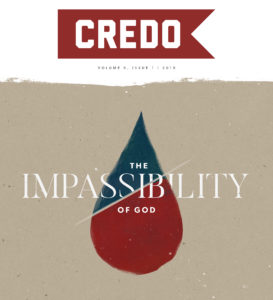In John 17:3, Jesus proclaims: “And this is eternal life, that they know you, the only true God, and Jesus Christ whom you have sent” (ESV). As a part of his High Priestly Prayer, it is easy for contemporary evangelicals to read Jesus’s words through a primarily soteriological lens, as a text that teaches us how we are saved. But to read the text as solely pointing to how we are saved misses its profound teaching concerning what eternal life is: knowing God in the face of Christ.
The knowledge of God is inexorably bound up with the doctrine of salvation. This is why John Calvin, in his 1542 Geneva Catechism answers his first question, “What is the chief end of human life?” by stating, “to know God by whom men were created.” And, it is why the 17th century Dutch Reformed theologian Wilhelmus á Brakel wrote: “it is the duty of all who practice religion [Christianity] to reflect continually upon God as He is, to live in contemplation of Him, and to walk before His countenance…” (Brakel, The Christian’s Reasonable Service, I:133).
And yet, within the landscape of modern evangelicalism, the doctrine of God, in which we come to know the nature and character of God, has often been considered impractical and irrelevant for life. The trend has been either to neglect the doctrine of God or try to augment it in order to make God more relatable and relevant. However, far from making God relevant and relatable, these impoverished doctrines of God have weakened and eroded the joy, blessedness, rest, and assurance that the knowledge of God in the face of Christ brings to believers.
Thankfully, there has been some renewed interest in the doctrine of God among various evangelicals, resulting in some excellent books that draw on the riches of the Christian tradition’s reflection on God in order to revitalize the doctrine of God within evangelicalism. While I commend these books to pastors and churchgoers, in this article, I also want to recommend pastors and churchgoers to follow these books in reaching into the treasures of the past. Specifically, I want to recommend the Dutch Reformed theologian Herman Bavinck’s doctrine of God.
There are innumerable reasons why Bavinck (1854-1921), who lived and wrote at the turn of the 20th century, is worth reading on pretty much any theological topic. However, I want to highlight just three aspects of his doctrine of God that show why it is particularly worth the time and effort.
1. Intellectually Edifying, Spiritually Enriching
The first reason to read Bavinck’s doctrine of God is that it is intellectually edifying and spiritually enriching. While many today might place rigorous intellectual engagement and spiritual edification at odds with one another, Bavinck sees them as inseparably related. As he writes at the beginning of his doctrine of God in his four-volume magnum opus, The Reformed Dogmatics:
The knowledge of him [God] alone that dogmatics must put on display. By pursuing this aim, dogmatics does not become a dry and academic exercise, without practical usefulness for life. The more it reflects on God, the knowledge of whom is its only content, the more it will be moved to adoration and worship…The knowledge of God-in-Christ, after all, is life itself (Bavinck, Reformed Dogmatics, II.29).
In this affirmation, Bavinck not only situates his own theological reflection on God within the long Christian tradition of relating the doctrines of God and salvation but also highlights the relationship between faith and knowledge. For Bavinck, knowledge is not at odds with faith. Far from an arid and detached exercise, theology is faith at work seeking to understand God as he has revealed himself in scripture and creation. Serious intellectual engagement—particularly in the doctrine of God—is not an enemy of faith but a part of its calling.
Knowing God leads to the worship of God. In fact, for Bavinck, theology itself is a form of doxology that, in its service to the church, is meant to draw believers into a deeper and more profound sense that “God does not exist for us but that we exist for him” (Bavinck, Our Reasonable Faith, 130). The ability of Bavinck to weave together rigorous academics with tender-hearted reverence is the first reason his doctrine of God is worth reading. The ability of Bavinck to weave together rigorous academics with tender-hearted reverence is the first reason his doctrine of God is worth reading. Share on X
2. Transcendent and Immanent: Bavinck and the Attributes of God
The second reason Bavinck’s doctrine of God is worth reading is his keen awareness of two of the most common pitfalls in our understanding of God: (1) making God into “nothing but an enlarged version of a human person” or (2) making God into “a cold abstraction that freezes and destroys the religion of the heart” (Bavinck, Reformed Dogmatics, II.46). The former, according to Bavinck makes God completely immanent, drags God down to the level of creatures, and makes him nothing more than a larger and better human. The latter makes God detached, completely removes God from the world, and makes any knowledge or relationship with God impossible. God is completely removed and absent. While both are particularly pernicious, Bavinck anticipates, with extraordinary accuracy, which tendency will dominate in the 20th century: making God into “nothing but an enlarged version of a human person.” This tendency is certainly present, even tacitly, in the minds and hearts of many evangelical pastors and churchgoers today.
But it is not just Bavinck’s foresight that makes him worth reading, it is his ability to uphold divine transcendence and divine immanence in such a way that God is both sublime and exhausted above creation and yet engaged and present in it. According to Bavinck, these two must be held together because scripture holds them together. And, in his treatment of the divine attributes, he holds them together by distinguishing but relating the incommunicable and communicable attributes of God. For Bavinck, the incommunicable attributes of God (independence, immutability, infinity, unity) guard the Godness of God by articulating the “way in which all that is in God exists in him” (Bavinck, Our Reasonable Faith, 137).
The communicable attributes, on the other hand, reveal the content of God’s being but only analogously and only on the basis of God’s revelation. What does this mean? Well, for Bavinck it means that the incommunicable and communicable attributes serve and illuminate one another. In Our Reasonable Faith, he uses the example of God’s love. According to Bavinck, we can know something about God’s love because he has revealed it to us, and it has a weak and pale resemblance to human love. But, unlike human love, God’s love exists in him independently, immutably, infinitely, etc. Every communicable attribute is at once incommunicable. God’s love, goodness, justice, etc. are not bound by creaturely limitations. They can be known but not comprehended; understood but not fathomed. Thus, in every moment of immanence, God is wholly transcendent.
For Bavinck, then, the incommunicable attributes are not the result of philosophical speculation or reason run amok, but they help us to understand the God who has revealed himself in scripture. They protect the Godness of God. God is not a big human in the sky who feels and changes as he relates to creation, but someone who is complete and full from all eternity and has chosen to create. Creation does not exhaust God or change him, according to Bavinck, but manifests who he is from all eternity. It is in his manifestation that we come to know him. And this reality is, according to Bavinck, what gives great rest to the human heart. This reality comes into even fuller expression in his articulation of God’s divine triunity. Bavinck is nothing if not a thoroughly trinitarian theologian.
3. Reformed in Vision, Catholic in Scope, and Remarkably Contemporary
Finally, the third reason Bavinck’s doctrine of God is worth engaging is that while Bavinck is shaped and guided by Dutch Reformed confessional theology, his doctrine of God reminds its readers that the broad brush-strokes of the classical Christian doctrine of God belong to the church catholic (small “c”). To read Bavinck’s doctrine of God is to be immersed deeply in the theological tradition of Augustine, Aquinas, Calvin, and others. And, just like many in the theological tradition, Bavinck never shies away from engaging the theology of his own day, both positively and negatively. As such, Bavinck serves as a wonderful guide to those seeking to teach and preach the doctrine of God today.
In terms of where to start with Bavinck, the more philosophically and theologically trained will find Bavinck’s doctrine of God in volume 2 of the Reformed Dogmatics wonderfully rich and intellectually engaging. For those who want to dip their toes into Bavinck’s theological waters, his shorter and more pastoral work, Our Reasonable Faith (esp. chapters 1, 2, 9, & 10) is a great place to start.


